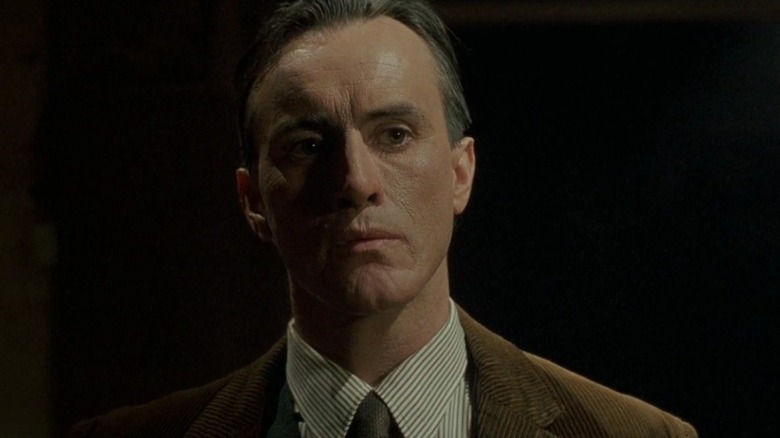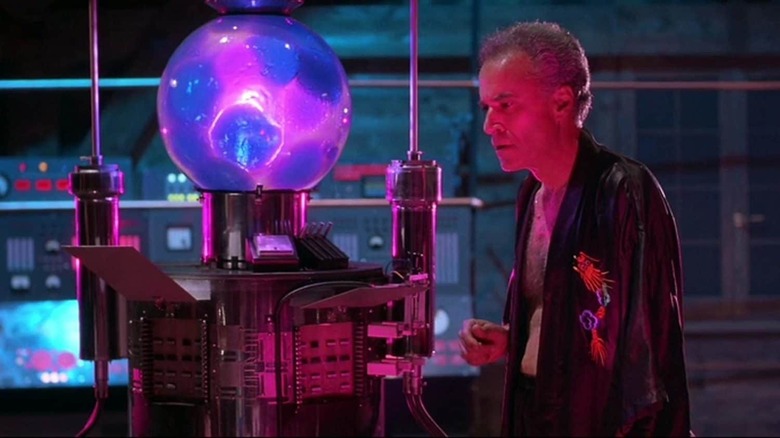Warner Bros.
Stephen King, the acclaimed author, has a diverse literary palette, with a penchant for novels like “Lord of the Flies” and “Watership Down”. Despite his love for non-horror literature, King doesn’t shy away from acknowledging the influence of other genre masters. His literary repertoire is largely dominated by horror, a genre he was drawn to through the pulp horror, genre magazines, and EC Comics of his childhood. King’s 1982 work, “Creepshow”, is a testament to his admiration for the “Tales from the Crypt” and “Shock SuspenStories” issues he read as a young boy in the 1950s. His horror influences are evident in his work.
When asked about the literature that shaped his writing, King fondly remembers the numerous books he read as a child. He was captivated by the imaginative tales of Ray Bradbury, the enthralling mysteries of Carolyn Keene’s Nancy Drew, and the chilling horror of Robert Bloch’s “Psycho.” King holds a special place for Richard Matheson’s 1956 novel “The Shrinking Man”, which was later made into the acclaimed film “The Incredible Shrinking Man”. In an introduction to William Golding’s “Lord of the Flies”, King shared how the book altered his perspective on literature after it was suggested by a bookmobile driver. As King puts it, the book portrayed children as they truly are, making it more than just entertainment, but a matter of life and death.
In an interview, King expressed his fondness for the 1950s EC Comics. He attributed the horror rags of William Gaines as a major influence, sparking his interest in horror at a young age, along with the films he watched during that time. He was particularly drawn to “Creature from the Black Lagoon” and “The Brain from Planet Arous”, all while secretly indulging in the works of Bradbury, Bloch, and his favorite, H.P. Lovecraft.
H.P. Lovecraft

New Line Home Video
On the topic of his favorite childhood horror books, King revealed:
“My early reading years were greatly influenced by Bradbury (though I discovered him in my teens), Bloch, and a few ’40s paperback editions of Lovecraft that I stumbled upon in my aunt’s attic. Lovecraft had the most profound impact on me, and despite his flaws, I still believe he is the finest horror fiction writer America has ever produced.”
This high praise from King certainly makes a compelling case for delving into the short stories of H.P. Lovecraft.
For those not familiar with Lovecraft, he was a reclusive author from Providence, Rhode Island, not too far from King’s own hometown of Portland, Maine. Lovecraft’s father was institutionalized when he was just a toddler in 1893, and he lived with his mother until she was institutionalized when he was 29. He ended up living with aunts whom he despised. As an adult, Lovecraft wrote essays and short stories for various local magazines and became involved with the local fantasy writer community in the 1920s. He rarely left his house, and after a stint in New York, returned to Providence to write the tales he is best known for, notably, the stories in what has come to be known as the Cthulhu mythos. “Cthulhu” is meant to be unpronounceable, sounding like a combination of a guttural cough and the words “clue-lou.”
Lovecraft had a bleak, dismissive, almost Kafka-like view of the futility of humankind. Many of his stories involved mad cults summoning ancient space deities to reclaim the Earth. He noted that human beings were but specks of imperceptible life on a planet that was once ruled by creatures so large and strange, human beings would go mad just to look at them. He created a whole panoply of ancient deities, each one more terrifying than the last. Cthulhu was among them.
The above photo is actor Jeffrey Combs playing Lovecraft in the 1993 anthology film “Necronomicon.”
Lovecraft, the media giant

Empire Pictures
Furthermore, Lovecraft had a unique command over classic prose that ignited the imagination and encouraged reading aloud. Lovecraft drew inspiration from Poe, but parallels can also be drawn with the later works of Vladimir Nabokov. Both authors had a love for the English language that was evident in their works.
However, unlike Nabokov, Lovecraft remained relatively unknown throughout his life and never achieved mainstream success. Other authors championed his work — notably August Derleth — but he died alone at the age of 46 from colon cancer. His existing works have since been compiled into numerous easily accessible anthologies.
Due to his ornate prose and fascination with the fantastical, Lovecraft eventually became a favorite among teenage nerds everywhere. His works served as the foundation for numerous monster movies (Stuart Gordon’s films “Re-Animator” and “From Beyond” are based on Lovecraft stories), and it’s nearly impossible to enter a board game shop without encountering numerous games derived from Lovecraft’s work. Enterprising horror fans can even purchase Cthulhu plush toys at Comic Cons and pop culture shops. Lovecraft has a significant presence in the geek community and has become a minor media empire in his own right.
King also mentioned that Lovecraft had shortcomings, likely referring to Lovecraft’s overt and unabashed racism. Lovecraft occasionally included racist language in his stories, implying that non-white people were lesser human beings, and he named his cat… well, you can look that up for yourself. He was also sexist, rarely including female characters in his stories. He was a bitter, reclusive man with dark ideas and a heart filled with hate. His verbose, shadowy stories of creatures and madness are also exhilarating to read. King isn’t the only author to have been inspired by Lovecraft.
Frequently Asked Questions
Q: Who is Stephen King’s favorite horror writer?
A: According to King himself, H.P. Lovecraft is his favorite horror writer, despite Lovecraft’s personal shortcomings.
Q: Why is H.P. Lovecraft considered a great horror writer?
A: Lovecraft’s unique style of writing, his creation of a pantheon of ancient deities, and his bleak view of humanity have all contributed to his reputation as a great horror writer.
Q: What impact did H.P. Lovecraft have on Stephen King?
A: Lovecraft’s work had a profound impact on King, influencing his own writing and shaping his interest in the horror genre.
Q: Where can I find H.P. Lovecraft’s works?
A: Lovecraft’s works have been compiled into numerous anthologies which are easily accessible online or in bookstores.
Credit: www.slashfilm.com


